|
|
Recordings of Other Vocal Works |
|
V-1 |
Bach: Motets: Jesu, meine Freude, Komm, Jesu, Komm, Singet dem Herrn ein neues Lied |
|
|
Motet Jesu, meine Freude, BWV 227 []
Motet Komm, Jesu, Komm!, BWV 229 []
Motet Singet dem Herrn ein neues Lied, BWV 225 [] |
|
Ferdinand Grossmann |
|
Wiener Akademie Kammerchor |
|
- |
|
Westminster XWN-18205 |
1954 |
LP / TT: |
| |
|
V-2 |
Schubert: Sérénade pour contralto, choeur et piano; Bach: Passion selon Saint-Matthieu (extrait) : pour soprano et piano |
|
|
Aria for Soprano & piano "Saigne à flots..." (sung in German) from Matthäus-Passion BWV 244 [] |
|
Ferdinand Grossmann |
|
Wiener Sängerknaben (Les petits chanteurs de Vienne) |
|
|
Pathé [mx. CPTX 512/513] |
1940 |
78 rpm |
| |
|
V-3 |
J.S. Bach: Saint Matthew Passion |
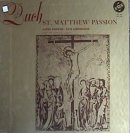
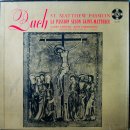
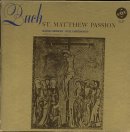
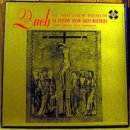
|
|
Matthäus-Passion BWV 244 |
|
Ferdinand Grossmann |
|
Wiener Akademie Kammerchor / Wiener Kammerorchester |
|
Tenor [Evangelist]: Erich Majkut; Bass [Jesus]: Harold Buchsbaum; Soprano: Laurence Dutoit; Contralto: Maria Nussbaumer; Tenor: Kurt Equiluz (?); Tenor [Arias]: Rudolf Kreuzberger; Bass [Arias]: Otto Wiener |
|
Stuttgart Europäischer Phonoklub (1960)
Vox STPL-513.320
Vox PL-8283 (1954)
Vox SVBX-5200 (1959)
Sine Qua Non SQN-149 (1975) |
1954 or earlier (not 1959) |
3-LP / TT: 176:30
3-CD / TT: 177:02 |
|
Recorded in Vienna, Austria.
This recorded version has several cuts in various “arias” as listed below:
- No.10 (6). Buß' und Reu. Aria for Alto.
"Da capo" (repeat of Buss und Reu) deleted: bars 106 to 161, using the bars 57 (162) to 68 (173) (Orchestra) to finish.
- No.19 (13). Ich will dir mein Herze schenken. Aria for Soprano.
Suppresses the orchestral introduction to the "da capo" [bars 1 (49) to 6 (54)], leaving attached Mehr als Welt und Himmel sein with the
"da capo" (Ich will dir mein Herze schenken).
- No.29 (20). Will ich mich bequemen Gerne. Aria for Bass.
Delete the second part of the aria (Denn sein Mund) and the "da capo"
(Gerne will), that is only interpreted the 72 first bars, being cut from 73 to the 174.
- No.61 (52). Können Tränen. Aria for Alto.
"Da capo" (repeat Können Tränen) deleted: bars 92 to 141, using bars 51 (142) to 64 (155) (Orchestra) to finish.
- No.75 (65). Mache dich. Aria for Bass.
Delete the second part of the aria (Denn er nunmehr soll) and the "da capo"
(Mache dich), that is only interpreted the 38 first compasses, leaving cut own 38 to 84.
Summary:
Small court: orchestral transition to the "da capo". Aria for Soprano No.19 (13).
Suppression of the "da capo". Arias for Alto: No.10 (6) and No.61 (52).
Suppression of the central section and the "da capo". Arias for Bass: No.29 (20) and No.75 (65).
Contrbuted by Antonio Fuentes, Úbeda (Jaén). España (March 27, 2013) |
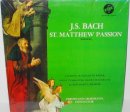
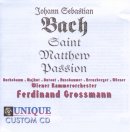 |
|
V-6 |
J.S. Bach: Oster-Oratorium BWV 249 |
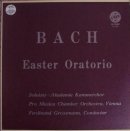
|
|
Oster-Oratorium BWV 249 [51:36] |
|
Ferdinand Grossmann |
|
Wiener Akademie Kammerchor / Vienna Pro Musica Symphony (Orchestre De Chambre "Pro Musica", Vienne) |
|
Soprano: Laurence Dutoit; Contralto: Maria Nussbaumer; Tenor: Ferry Gruber [Franz Gruber]; Bass: Otto Wiener
Cimbalom: Bruno Seidlhofer; Flute: Camillo Wanausek; Flute [Flûte A Bec]: Karl Trotzmueller, Paul Angerer; Oboe: Bruno Doerrschmidt; Oboe [Oboe d'amore]:
Joseph Koblinger; Organ: Joseph Nebois |
|
Vox PL-8620 (1954)
Orbis CX-10350 |
Jan 24, 1954 |
LP / TT: 51:36 |
|
Recorded at Musikverein, Grosser-Saal, Vienna, Austria.
Listen on YouTube: Oster-Oratorium BWV 249: Complete Work [49:45] |
|
|